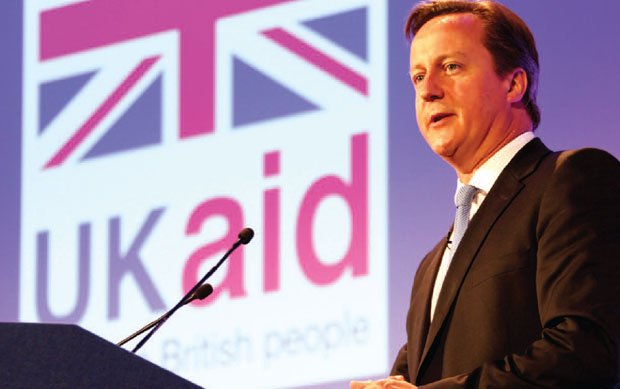“IF…” campaign was agreed with Government a year in advance

Memos from within the UK Department for International Development, released under Freedom of Information (FoI) legislation, offer a glimpse of how the big aid charities’ Enough Food For Everyone IF… campaign was developed in close collaboration with the department that is ostensibly the campaign target.
The extracts show how Andrew ‘Plebgate’ Mitchell, then International Development Secretary, told the chiefs of the big 5 aid groups that he would support their campaign on 12 December 2011 – more than a year before the campaign launch last week.
One civil servant wrote, on 3 February 2012:
DFID’s Secretary of State told BOAG heads in their recent meeting that he would be supportive of their campaign.
BOAG is the British Overseas Aid Group, made up of Oxfam, Christian Aid, ActionAid, Save the Children and CAFOD.
Referring to the same meeting, another official writes:
BOAG presented initial ideas for their 2013 campaign to DFID SoS [Secretary of State] at meeting on 12 December.
This means that early plans for the campaign were submitted to the government before they were shared with many of the 100+ organisations that make up the IF coalition.
Repeated references to a ‘big moment’ or a ‘gold moment’ throughout the memos show how, from the start, the campaign has been planning with DfID to create a pro-government splash in the immediate run-up to the G8 summit, being held this year in the Lough Erne golf resort-turned-fortress in Northern Ireland.
An internal email from as far back as September 2011 reads:
BOAG public campaign – [Christian Aid Director] Loretta Minghella explained BOAG’s interest in a big moment in 2012-13 on food and hunger. People would understand a campaign on these issues because it so tangible. They wanted to work with DFID.
The SoS said there was a lot of common ground in our thinking. But we would never replicate 2005. The SoS suggested a ‘golden moment’ in 2012, which the NGOs could then follow… He asked what an NGO campaign would be able to add to the food security agenda, beyond the buzz of a campaign?
And a policy analysis document later recounts:
“[Save The Children Chief Executive] Justin Forsyth has submitted a note to the Secretary of State with ideas for the gold moment the most substantive of which was a proposed ‘High level hunger commission’ which would be mandated to make recommendations to a special meeting convened during the UK G8 Presidency in 2013.”
War on Want, whose FoI request secured release of the documents, have outlined their reasons for staying out of the IF campaign, citing this closeness to government as well as recognising that the stated aims of the campaign do little or nothing to challenge the system of impoverishment and hunger. War on Want noted that they are:
“particularly concerned that the IF campaign in promoting a false image of David Cameron and the UK government as leading the fight against global hunger, at a time when nothing could be farther from the truth. A number of the aid agencies at the centre of the IF campaign have already praised the UK prime minister for his “leadership role” in holding a hunger event with Mo Farah and other celebrities at the end of the London 2012 Olympics. Internal documents obtained by War on Want through a Freedom of Information challenge reveal that the government has for two years been planning with the aid agencies to use the IF campaign to promote the prime minister as a leader on the global stage.”
Fellow anti-poverty campaigners World Development Movement have also declined to take part, as have the trades unions.
While I absolutely share WDM and War on Want’s concerns about the narrow, symptomatic focus, I would never argue that more and better aid, action on tax-dodging, less Northern exploitation of Southern land, and transparency in the global food economy are not worth having.
The real scandal of the IF campaign is that it appears to have been shaped more by the desires of the target department than by those of its members, and not at all by the views of its supposed beneficiaries in developing countries. It is constructed around a ‘golden moment’ pro-government PR event intended to ingratiate aid agencies (a large portion of whose funding comes from DfID) with the present rulers, never mind that the agenda of those rulers is implacably opposed to reducing inequality or moderating the global capitalism that causes it.
Demanding the commitment of a huge portion of the UK international development movement’s campaign resources to a project that masquerades as a campaign but is actually a pro-government marketing drive is worse than bad campaigning – it’s campaigning malpractice.
If you, like me, want to see an end to hunger, don’t support the IF campaign. Give your time and money to organisations – like War on Want and the World Development Movement – that are prepared to take on power, not pander to it, in the fight to overturn the systemic causes of poverty and hunger.
Update: one of the member organisations of the IF campaign have asked me to draw your attention to this statement, written in response to War on Want. In it, they say it was essential for the campaign not to ‘over-promise’ and that this is the explanation for what appear overly modest asks, and they defend their strategy of praising David Cameron’s ‘leadership’.
Despite saying “Debates about the campaign are healthy and essential. We welcome them,” they showing regrettable arrogance in likening any dissent to the Judean People’s Front. I suggest that had the Judean People’s Front agreed their actions with Pontius Pilate in advance, the People’s Front of Judea would have been more than justified in being ‘splitters’.
Read the full Freedom of Information disclosure below:



Hmm it seems like your blog ate my first comment (it
was super long) so I guess I’ll just sum it up what I submitted
and say, I’m thoroughly enjoying your blog. I as well am an aspiring blog
writer but I’m still new to everything. Do you have any suggestions
for beginner blog writers? I’d genuinely
appreciate it.
my weblog: corporate identity design
I read the IF response with an eye to seeing how it might balance out the slightly angry ranting in this piece, checking for pro govt bias.
Frankly, they come across as having a more realistic agenda than you do. Negativity of any kind is divisive, and if there’s one thing you need in the face of the G8 idiots it’s to stand together.
Briefly – you’re not helping.
My problem is that it is a wasted opportunity. Wasted because the partners are too timid to ask for serious change. And wasted because it aims to garner positive publicity for David Cameron.
That’s the job of government, not campaign organisations.
“Then they won’t do most of what they’ve said they will.”
“So what you’ll get is an agreement, but no implementation.”
So your basic problem with the IF campaign is that you think it will fail. Fail, that is, to lead to any real change.
Anthony,
There are two aspects to answering your question:
1. We know that what will happen is that the G8 leaders will agree to do something (probably not everything) that IF is asking for. Then they won’t do most of what they’ve said they will. That’s what happened after the 1999 G8 on Debt Relief and the 2005 G8 on trade, aid and debt.
So what you’ll get is an agreement, but no implementation.
2. Yes, I think the UK government would have pushed for everything in the IF campaign. It was, after all, their idea. They want this to give David Cameron a “golden moment” [as described in the FoIs, which you would do well to read]. So the NGOs, had they wanted to actually achieve a better agreement, pushed the UK government even a little bit to get a better agreement.
The aim is to make Cameron look like a humanitarian and to help him get re-elected. The cynicism here isn’t ours, but the governments.
What will happen is that thousands of people die because corporate NGOs don’t have the courage to actually take government on. Maybe you’re ok with that. I’m not.
“Don’t ask for anything that wasn’t going to happen anyway”
“things that were going to happen anyway”
You really think the IF campaign is unnecessary? That the G8 leaders would have gladly done everything the IF campaign is pushing for, even if the IF campaign didn’t exist?
Anthony,
Thanks for your comment and its generous spirit. Satire is my favourite form of comedy.
I’d say though that many of us remember how badly the world’s poor were done by in 2005. That was something we all went along with. A big showy campaign (Make Poverty History) that aimed to deliver big objectives. An agreement that amounted to limited progress and little delivery.
The utter failure to deliver on the Millenium Development Goals is further evidence that this approach is fatally flawed.
So what is the lesson that the corportate NGOs have learnt?
Don’t ask for anything that wasn’t going to happen anyway, make sure that you heap praise on a government, however damaging their actions are and hope that you can tick it off as an ‘achievement’.
Maybe if those corporate NGOs pointed, as War on Want have, to the utterly cynical actions of the UK government (spending overseas aid money on the vital, hunger-ending purpose of marketing for Monsanto), instead of cosying up to it we’d have some hope that this was anything other than an exercise in toadying.
And yes, perhaps that might mean pointing out that the global economic system causes poverty. The actions of some of those involved in this blog, while doubtless not glossy or corporate enough for you have done a substantial amount to put issues like tax dodging on the agenda.
But then perhaps if UK Uncut spent millions on TV ads and asked for things that were going to happen anyway, our actions would avoid your ire…
I’m trying to imagine how this post could have been more cynical, but I’m not finding it easy.
Clearly you see it as a fait accompli that the G8 will agree to everything the IF campaign is pushing for. Maybe you’d like to justify that? Maybe it’s obvious to you that the G8 leaders are just gagging for the opportunity to tackle malnutrition, if enough hype can be generated in advance?
However, I do hope you are right, and look forward to your next cynical post, after global hunger is substantially eradicated, bemoaning the fact that certain politicians have been given far more credit than they deserve for taking decisive action towards that goal.
Or maybe you’d prefer a stronger campaign, demanding a complete overhaul of the global economy – a campaign that is bound to achieve absolutely nothing, but which will allow self-righteous idealists to feel smug about themselves and their courageous assaults on power, while people continue to starve?
“The best is the enemy of the good.”
I wish in my time the Judean People’s Front had behaved like modern-times British NGOs….
Surprised that people are surprised. This is only repeating the strategy of 2005 with Make Poverty History. Co-opting and diverting dissent is as much a part of G8 summit security as remote locations, militarised policing and fences.
What a bunch of c*nts